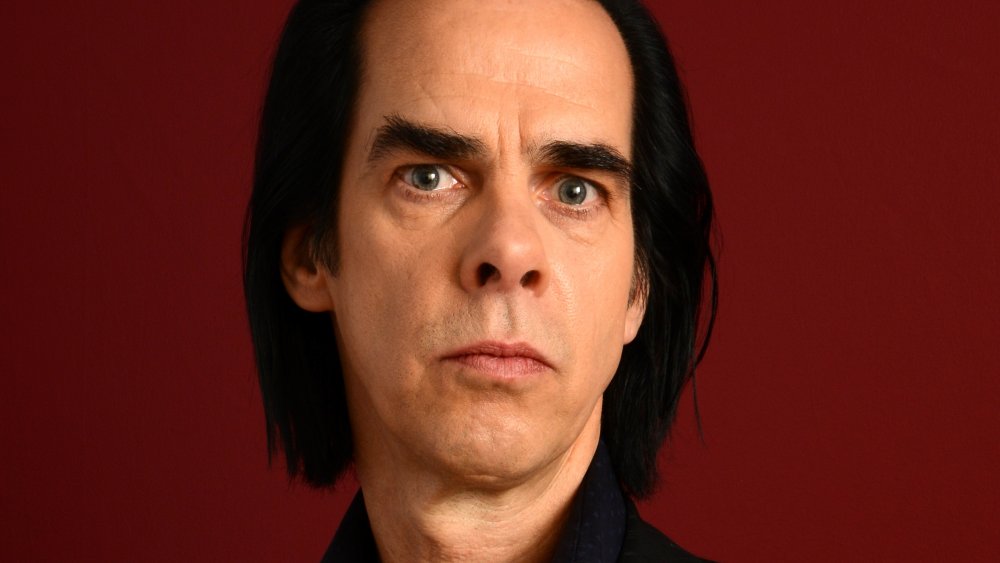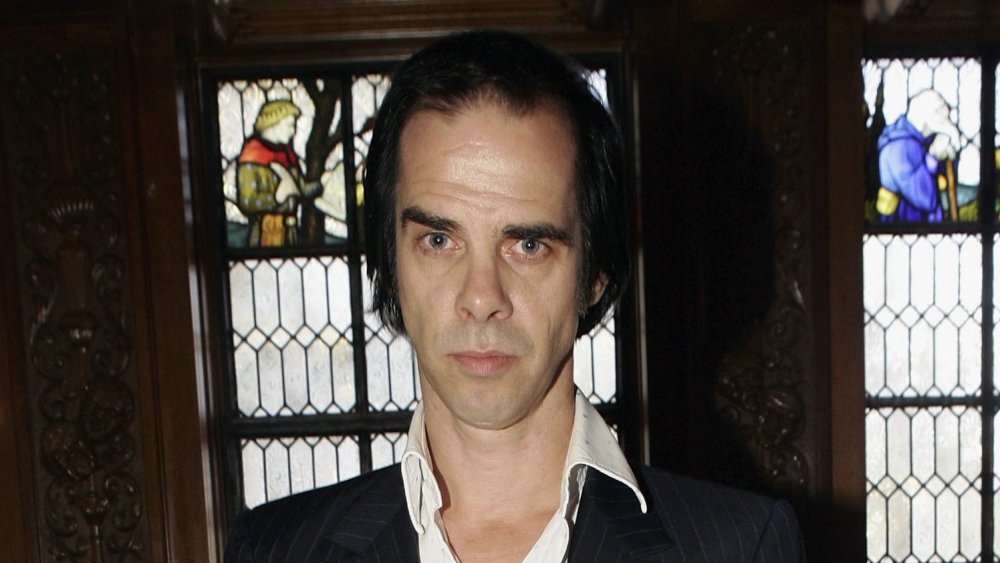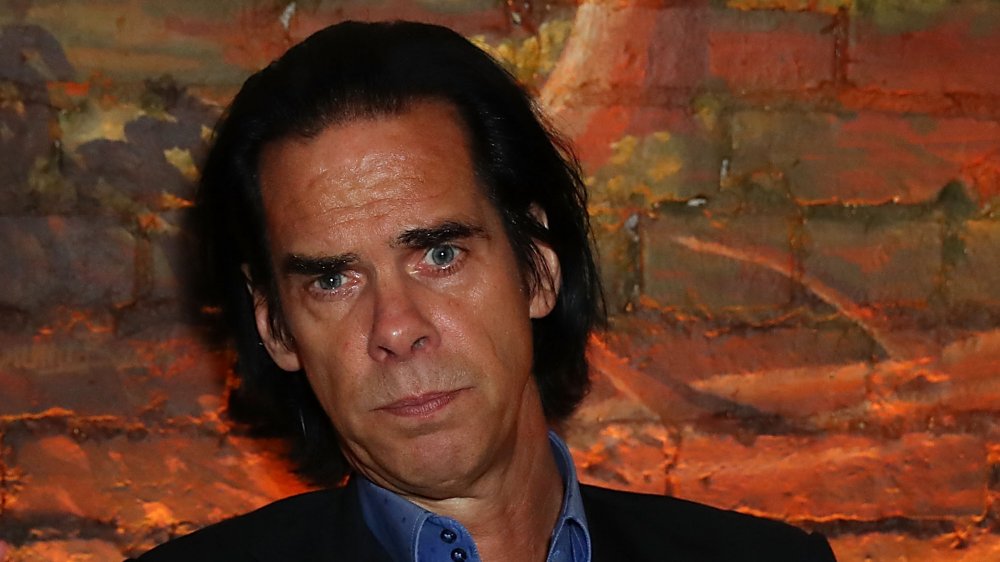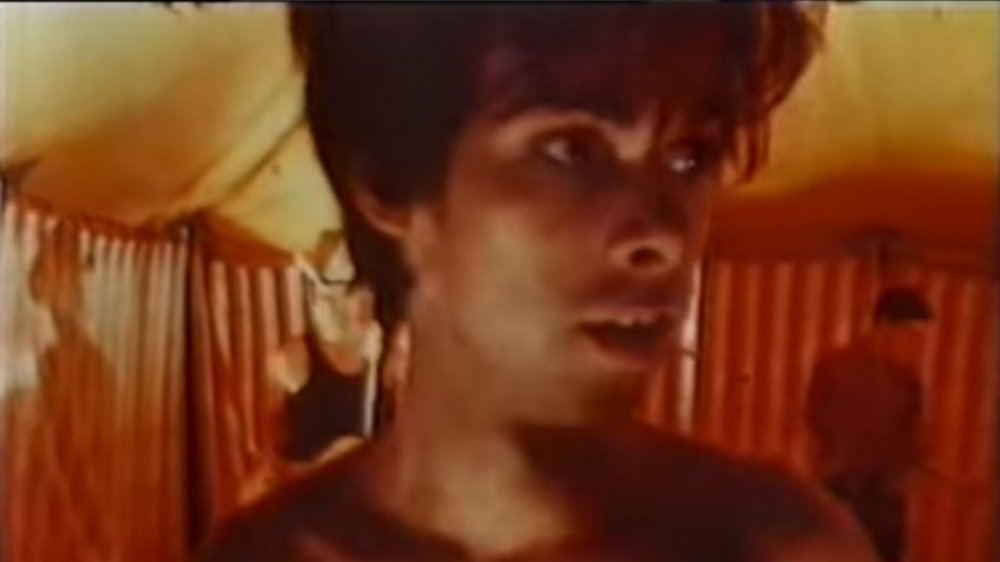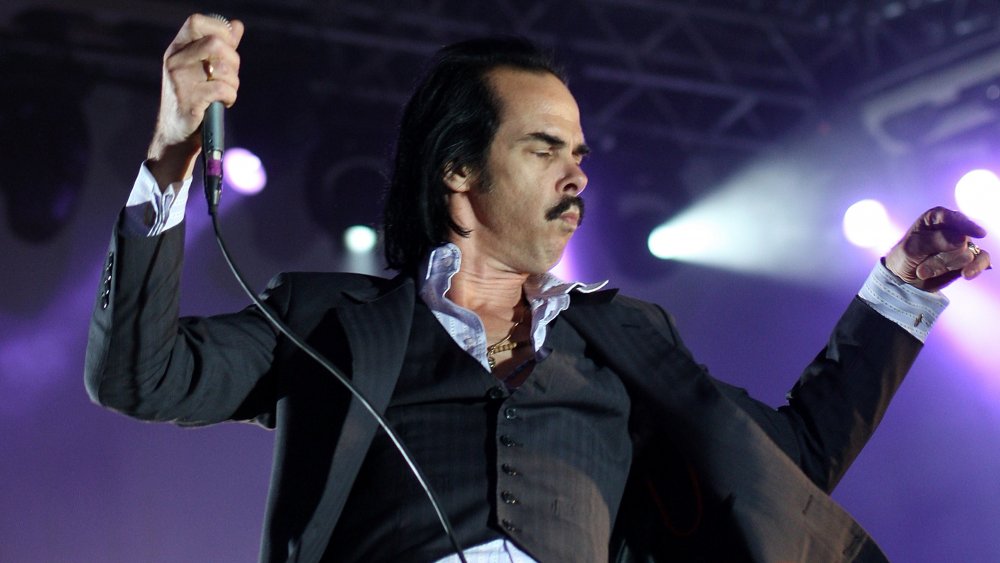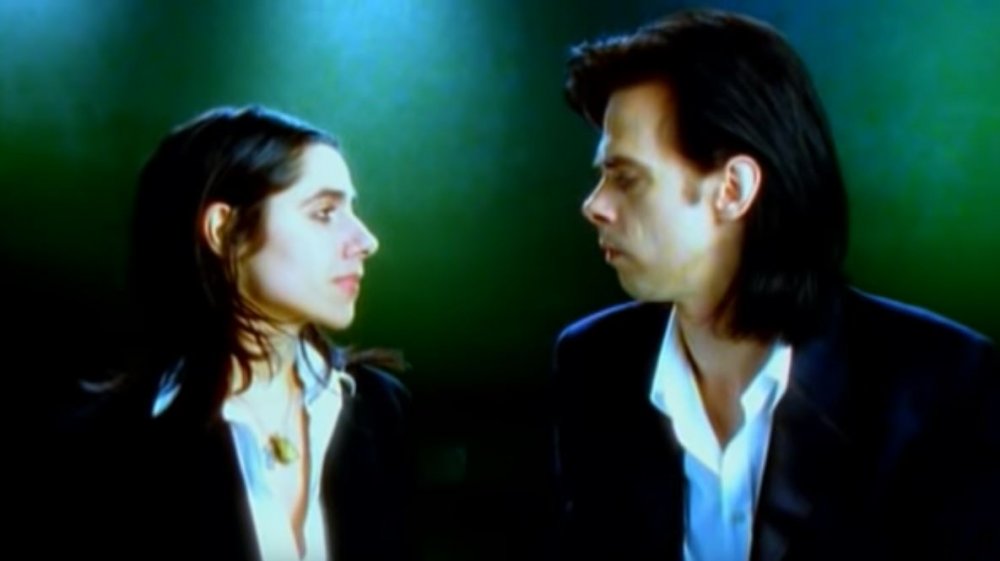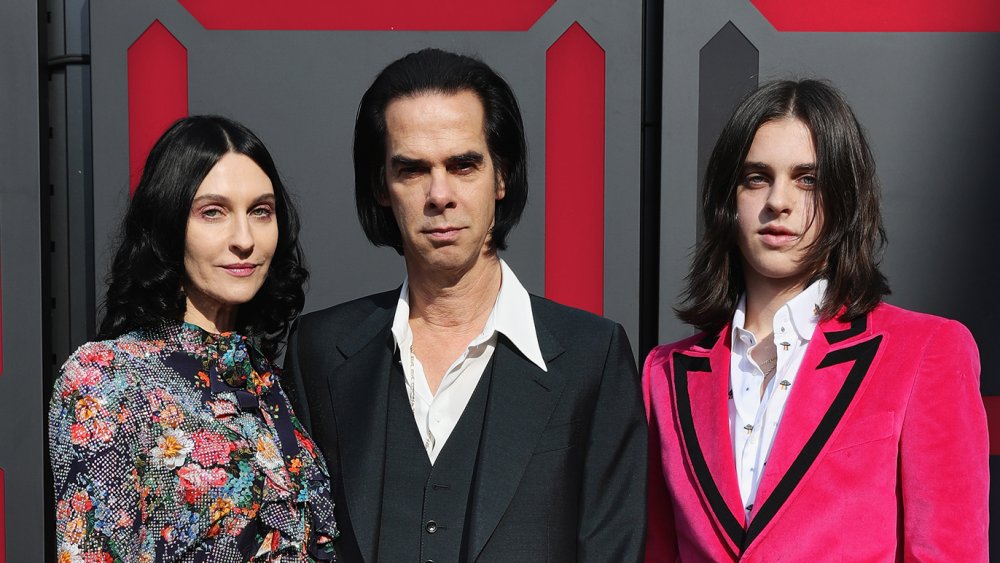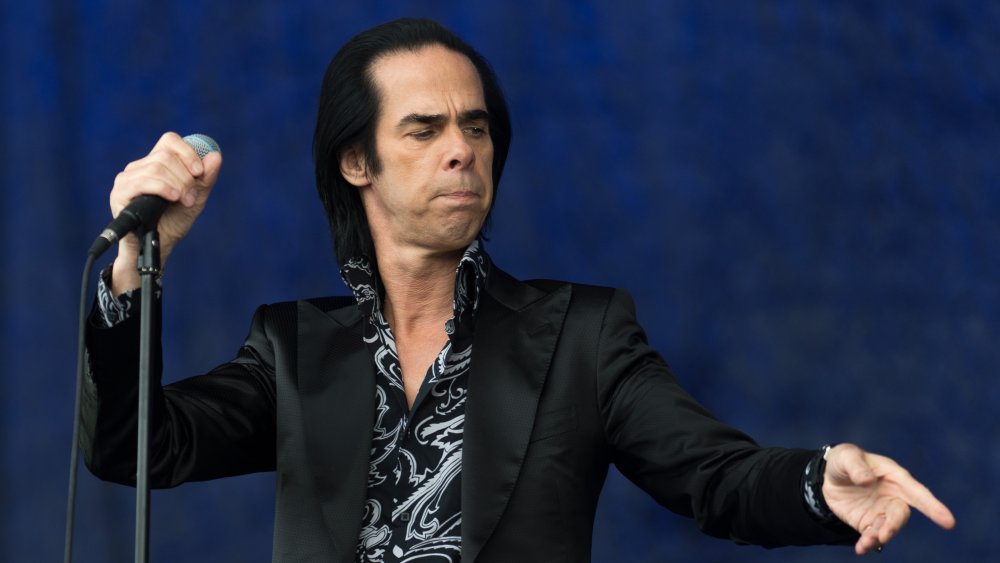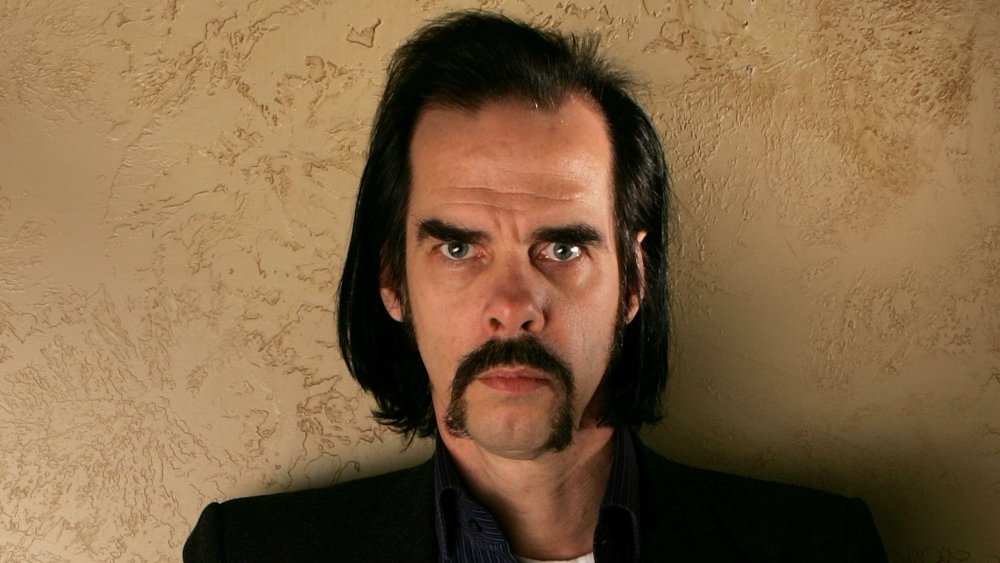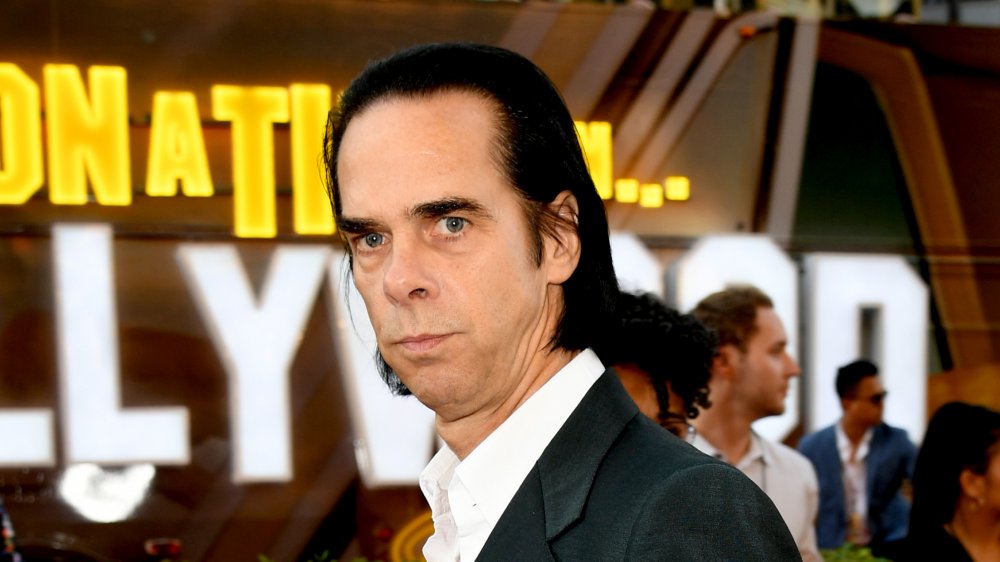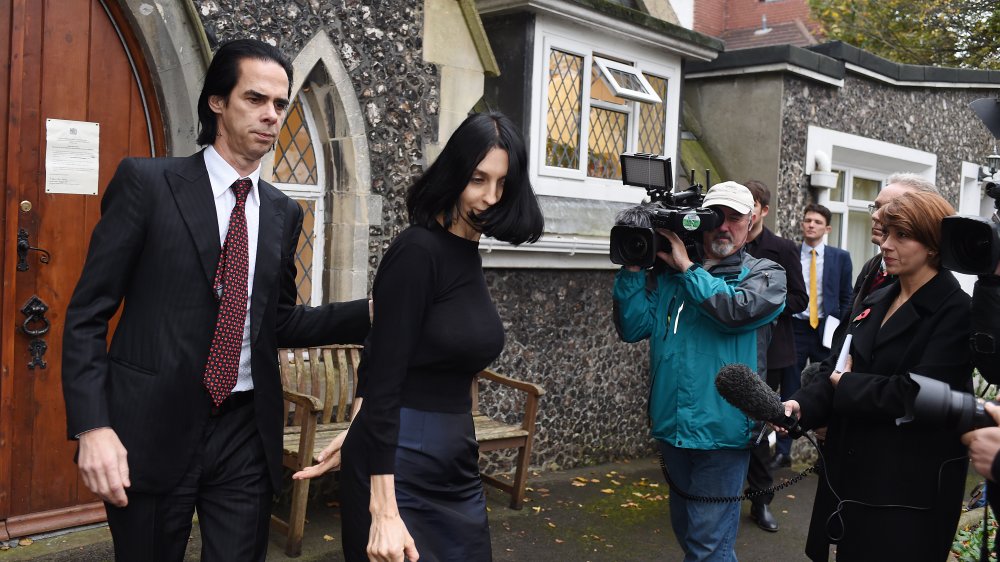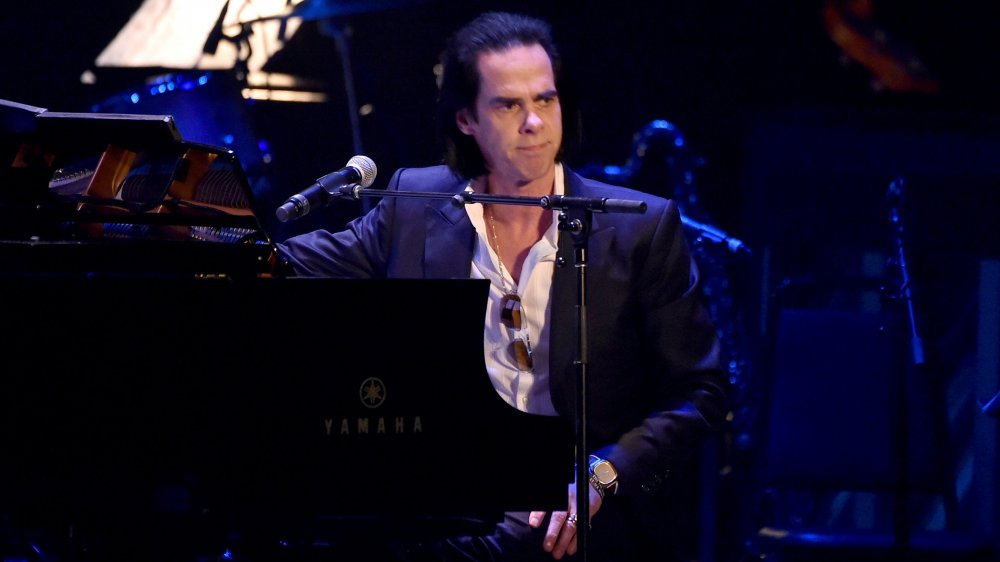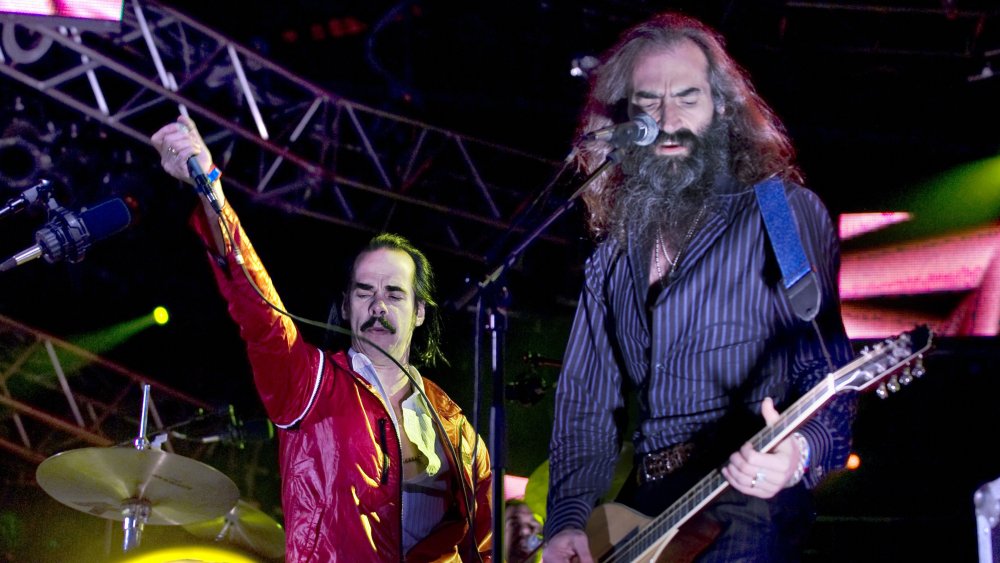The Tragic Real-Life Story Of Nick Cave
Some people call Nick Cave the Godfather of Goth, and the name is equally apt to his artistic output and his personal history. A towering, dark, intense figure whose lanky frame is nigh-invariably clad in a tailored suit, his imposing presence can lure you to believe that the man exists on a separate plane of gloom and suffering, hovering somewhere slightly above mere mortals. This is no exaggeration: As the Independent reports, Cave once mentioned taking a train to a show, which his audience found difficult to believe. When the bemused artist inquired how exactly people thought he got there, the answer was: "I dunno. A hearse?"
Still, even if the man takes the train just like the rest of us, his gloomy fire-and-brimstone image is not entirely unjustified. Over the decades, Cave has been forced to soak a lot of damage, both self-inflicted and brought on by unforeseen tragedy. There have been many storm clouds over his head, and here are some of the darkest ones. This is the tragic real-life story of Nick Cave.
Nick Cave's difficult early years
Nick Cave's origin story is a classic "I come from a town you've probably never heard of" one, but with a touch of darkness that's oddly appropriate for his later rock star escapades. As the Guardian and Sydney Morning Herald record, Cave hails from Warracknabeal, a rural area of Victoria, Australia. The family later moved to the small town of Wangaratta, where he enjoyed the landscape but "hated" the small-town attitude. As such, the son of a teacher and librarian soon started rebelling against his uncool hometown and "getting into trouble." In response, the 12-year-old Cave's parents sent him to a boarding school in Melbourne, where his artsy nature and disinterest in sports led to an outcast status. Fortunately, he wasn't completely alone, as he met a few kindred spirits who would eventually form Cave's significant band, the Birthday Party.
Cave and his friends were considered, as he inelegantly puts it, "the school poofters," and rumors about their homosexuality ran rampant. According to one story, they once retaliated by walking the school hallways carrying handbags filled with bricks, and used their makeshift weapons to bludgeon anyone who insulted them. While there is some doubt to the veracity of this particular anecdote, Cave himself couldn't care less. When a journalist directly asked him whether the story about the "handbag boys" is true, Cave countered dryly: "Oh, you're only interested in the truth rather than a good, entertaining article."
Nick Cave's father died in a car crash
One of the major tragedies in Nick Cave's life struck when the singer was only 19-years-old. As the Guardian tells us, the nascent post-punk poet was estranged from his father, Colin. Colin Cave, who was a teacher by trade, was a serious person who appreciated culture and beauty, which put his outlook at odds with that of his son, who tended to find all beauty "corrupted and destructive." Unfortunately, the father and son were never able to mend fences, as Colin unexpectedly died in a car accident.
By his own admission, Cave is still profoundly upset by the incident, and he has been known to ask journalists to skip asking about the subject entirely and "just Google it." This may have something to do with the fact that at the time of his father's car crash, Cave himself was in jail thanks to a burglary charge, and his mother was bailing him out at the police station. Perhaps not coincidentally, Cave's life went through a number of major changes after the tragedy: His art school studies came to a halt, and he decided to move to England with the Birthday Party.
Nick Cave and the end of the Birthday Party
It's difficult to imagine that a man who has dueted with Kylie Minogue, whose hands wrote the theme song for Peaky Blinders, and whose catalog has been covered by artists as diverse as Johnny Cash and Snoop Dogg has ever been considered anything but supremely talented. However, as GQ tells us, there used to be a time when no one thought Nick Cave would ever amount to anything. When the Birthday Party fell apart in 1983, absolutely none of his peers expected anything of the singer, and his reputation was pretty much as low as it could go. How low? According to notes of a reporter from those days, " The consensus was that he was a vaguely psychotic drunken f****d-up drug addict, deceiving himself with vain delusions of glory." Ouch.
Of course, Cave could only blame himself for his less than exemplary street cred. During their 1980-1983 tenure in London, the Birthday Party's manic and violent sound had made them a divisive act, and they ended up responding to the critics by slowly changing from a band with attitude to one that, as Cave put it, "very much took to insulting the audience." This, along with Cave's fondness of assorted substances, evidently wasn't a good way to make friends in Britain's art-rock circles.
Nick Cave's hard-hitting 1988 interview
Nick Cave is famously suspicious of journalists, and arguably one of his worst experiences came in 1988 when Jack Barron conducted an interview that cut deeper than Cave intended. As the Guardian tells us, the Bad Seeds frontman was already exhausted by an insane year that involved editing his debut novel And The Ass Saw An Angel, releasing his King Ink literary collection, getting involved in two different movies, and taking care of his day job during the Tender Prey album cycle. Add to all this his gargantuan heroin habit, and you have a recipe for an unmitigated disaster.
Having followed the Bad Seeds around, documenting their day-to-day life for some time, Barron got his first interview with Cave at 3 a.m. in a hotel room. Despite finding the singer a "journalist's nightmare," he managed to get Cave talk about his drug habit, which was an open, but virtually unreported secret at the time. Unfortunately, Cave soon regretted opening up, and forced a deal where he'd give a second, more measured interview about the subject on the condition that Barron would keep the more sensitive material from the first interview under wraps. The second interview was an extremely hostile affair that ended when an enraged and clearly worse-for-wear Cave attempted to beat up the writer and destroy the tapes. Unsurprisingly, Barron's article about Cave was less than pleasing, starting from its very title: "Nick Cave: 'I have to spend hours talking to f***ing idiots like you.'"
Nick Cave's breakup with PJ Harvey
One of Nick Caves most famous romantic adventures was his relationship with fellow musician PJ Harvey, which the Guardian tells us started when they were filming a video for their duet, "Henry Lee." While their chemistry is plainly obvious in the video, their relationship wouldn't last, and they broke up when Cave was working on his 1997 album The Boatman's Call.
In 2019, Cave elaborated the breakup on his website, the Red Hand Files, by answering a fan question about the subject. According to Cave, Harvey was the dumper in this particular relationship, with a phone call out of the blue. "I was so surprised I almost dropped my syringe," Cave dryly notes, letting us know the likely reason for Harvey's decision to leave him behind. However, he says that even without drugs, there were a great number of issues with the two. He hadn't quite internalized "the concept of monogamy," and they were both so focused on their creative careers that they weren't really able to coexist.
Perhaps fittingly, it was creativity that mended Cave's broken heart. The Boatman's Call was in no small part inspired by Harvey, and Cave even says that the album "cured" him of her.
Nick Cave's tumultuous family life
Nick Cave has fathered four sons, and as is often the case with him, things have not always been as straightforward as one would expect them to be. According to the Guardian, apart from Arthur and Earl, the twins he had with his current wife Susie Bick, he also has a pair of older sons who are the same age, Luke and Jethro. However, the two elder sons are not twins. In fact, they were born to two different women, just 10 days apart — Luke in Brazil, where Cave was living at the time with Viviane Carneiro, and Jethro in Australia. To his "eternal regret," Cave chose to keep out of Jethro's life for the boy's early years, though he insists he now "has a great relationship with him."
When Cave was asked whether there was any "domestic strife" over the situation, he admitted that things were awkward for a while: "It was difficult at the time, but it turned out great in the end."
Nick Cave's turbulent relationship with Deanna
As Entertainment Weekly reports, one of Nick Cave's most famous songs, "Deanna," is actually about a real person — namely, his old girlfriend, who was also called Deanna. Their time together was hardly a match made in heaven, and Cave himself says the two had "a borderline criminal kind of relationship." As the Guardian tells us, the two eventually broke up, and soon afterwards Cave released the song, which features some rather lewd lyrics and even suggests Cave and Deanna go on a murder spree together. All of this came as a rather nasty surprise to Deanna's new boyfriend, future famous director Andrew Dominik.
Ironically, Dominik and Cave grew close later in life, and have collaborated several times. Cave even allowed Dominik to direct One More Time With Feeling, the intrusive and heartfelt documentary that captured, among other things, the grief Cave and his family felt after his son Arthur died.
Nick Cave and drugs
Nick Cave is no stranger to narcotic substances. According to Entertainment Weekly, his drug of choice has always been heroin, and around 1988 he was so deep in the pit (and so very, very sensitive about it) that the Guardian reports he once physically attacked a journalist who tried to get him talk about it. However, even then, Cave seemed to realize how bad the thing he was shooting in his veins was, and was deeply concerned that his fans might start using drugs because of their idol. "I can't help it that I take this particular drug," he said. "I mean, it is that evil and insidious and it does worm its way into your life and it's very difficult to get it out again. Never have I spoken about it in any other way."
Cave eventually conquered his addiction after a couple of stints in rehab, and though he says that getting clean killed his creativity for a good seven months, it's probably fair to say that it returned with a vengeance. According to Junkee, he has been known to address his addict past on his "Conversations with Nick Cave" Q&A tour. He particularly credits Narcotics Anonymous for his recovery, saying that while he found their meetings "difficult," they were nevertheless helpful in his quest to ditch heroin for good.
Nick Cave's screenwriting disaster
Nick Cave has been known to moonlight as a screenwriter on occasion, but unfortunately, his most ambitious project is unlikely to ever see the light of day. According to the BBC, when actor Russell Crowe found out that director Ridley Scott was toying with a spiritual sequel for his hit movie Gladiator, Crowe decided to get his own screenwriter to ensure that his character Maximus would be front and center. For reasons known only to himself, Crowe decided to assign the screenwriting duty to Cave, who immediately pointed out that the task was fairly hard, seeing as Maximus was dead at the end of the first movie, and his character arc had been thoroughly resolved. Crowe replied: "Yeah, you sort that out."
Cave did precisely that, and spent ages painstakingly putting together an insanely detailed, complex story of Crowe fighting his way back from the underworld into the Colosseum where he faces off the latest evil emperor, and ultimately through history's greatest battles as an avatar of war who ultimately ends up at the Pentagon. As GQ tells us, all the while both Scott (who tried to steer Cave's script toward Ingmar Bergman-style existentialism) and Crowe ("Put a f***ing rhino in there!") kept giving him strange and conflicting prompts, which Cave did his best to accommodate. Perhaps predictably, the actor's only comment when he laid eyes at the finished product was: "Don't like it, mate." Oddly, Scott seemed to enjoy the script, though.
The tragic death of Nick Cave's son
In 2015, Nick Cave and his family experienced the biggest tragedy of their lives. As the Guardian reports, on July 14 of that year, Cave's teenage son Arthur accidentally fell off a cliff in Brighton and died of the head injuries he sustained. It was a particularly horrifying accident, as it soon transpired that Arthur and a friend had experimented with LSD earlier that day. The friend said that the experience was initially pleasant, but the trip soon turned bad with paranoia and intense hallucinations. Presumably, Arthur experienced similar symptoms, as multiple witnesses saw him "staggering" near the top of the cliff before he fell.
Cave's family was obviously shocked beyond belief, and as CBC tells us, they immediately issued a short statement: "Our son Arthur died on Tuesday evening. He was our beautiful, happy loving boy. We ask that we be given the privacy our family needs to grieve at this difficult time." In 2018, Cave discussed the grief he has dealt with ever since on his Red Hand Files website, saying that he has come to accept grief as an inevitable companion of love, and sharing some poetic advice on how to find your way back to the light.
Nick Cave's hard healing process
After his teenage son Arthur died in 2015, GQ reports that Nick Cave sought to deal with the sorrow by focusing on his work while simultaneously avoiding audiences and the media as best he could. However, when he eventually mustered the strength to step on stage again, he discovered that his relationship with the public had changed. The outpouring of support his fans had given him and his family during the tragedy, as well as his sudden realization that his live shows had taken on a much more "communal feeling," prompted the formerly gloomy and deliberately mysterious artist to start adapting a new healing process — a policy of openness that he admits terrifies him. He set up the Red Hand Files, a site where anyone can ask him anything with zero filters and moderation between the artist and the world. Then, he started his Conversations with Nick Cave events, which are basically a combination of a concert and a live version of the website.
However, Cave's newfound outspokenness and willingness to comment on anything hasn't always gone well. As the Guardian notes, his Q&A evenings have seen him struggle in front of a full house while trying to phrase an opinion about male sexual predators. NME reports he has courted controversy by dismissing modern "woke" culture, and the Guardian again tells us that he has also drawn the ire of the music community by calling artists boycotting Israel "cowardly and shameful."
Nick Cave's strange plagiarism accusation
In 2010, Nick Cave found himself in the center of an odd plagiarism accusation when, as NME reports, a 29-year-old Scottish musician called Frankie Duffy claimed that the musician had "borrowed" one of his songs for "Palaces of Montezuma," a song the Bad Seeds frontman wrote for his Grinderman side project. Duffy says that the song "Grey Man" by his old band Rising Signs is remarkably similar to the Grinderman tune, and alleges that Cave may have discovered the song by browsing for unsigned bands and stumbling upon the now defunct Rising Signs' MySpace, where "Grey Man" was still online.
As Paste notes, Cave utterly dismisses all notions of plagiarism. Shortly after the news broke, he almost mockingly addressed the situation to the audience during a Grinderman show: "You may have read that some 17-year-old kid in Dundee is trying to sue me and is claiming to have written this song. That's funny, because I wrote it for my wife."
